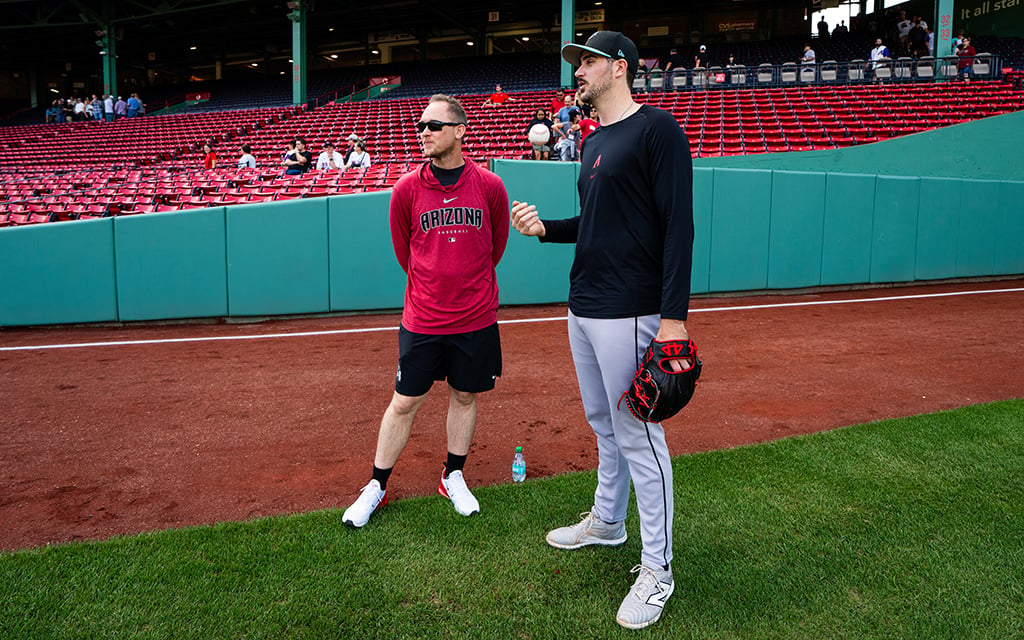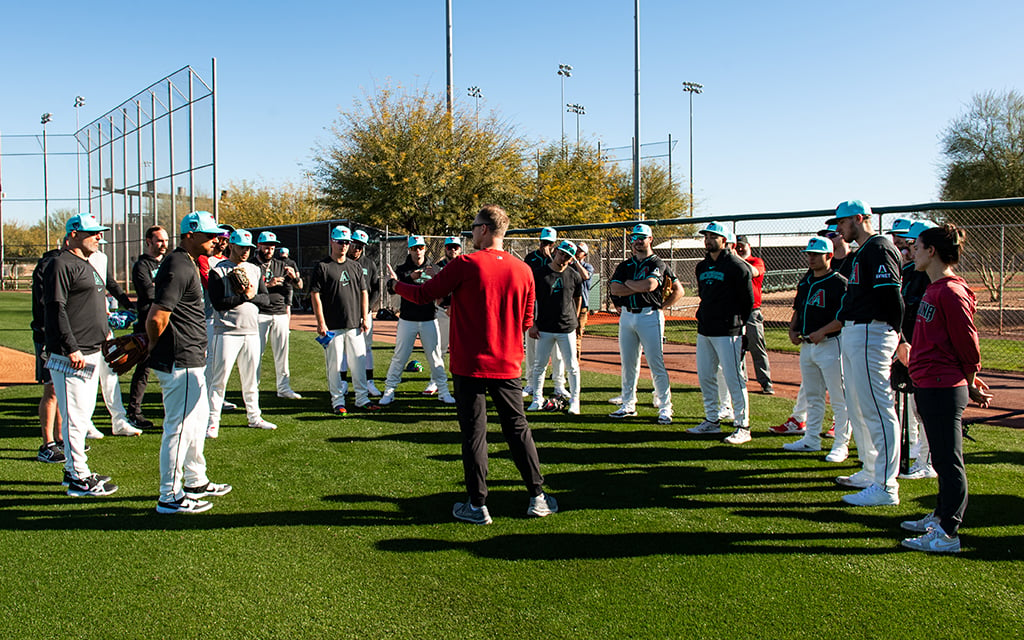
Zach Brandon watches batting practice with Diamondbacks pitcher Ryan Thompson before a 12-2 win at Fenway Park on August 23, 2024. (Photo courtesy of Zach Brandon)
PHOENIX – Major League Baseball – with its 162-game season, plus spring training, plus postseason for a lucky few – is a uniquely grueling sport physically.
It is also a uniquely mental game. Much of it is played in solitude. Players can do all the preparation and coaching they want, but when they ultimately step up to the plate or take the mound, they do it alone.
When a sport is as all-encompassing as baseball, how do players stay locked in on the game without losing themselves in it?
Calculating that balance isn’t easy. But it’s Zach Brandon’s job description.
Brandon is the Arizona Diamondbacks’ head of mental performance and coach development, a position he’s held since 2023. He has been a member of the Diamondbacks’ mental performance staff since 2018.
“On a personal level, I’ve always really appreciated the mental side of performance, and I’ve always been a proponent of what I would categorize as the whole person being brought into sport,” Brandon said.
In Brandon’s job, every day looks different. His work with individual players varies from person to person, but he views his role as a strength coach for the mind.
“Much like our players would go work with a strength coach to get bigger, faster, stronger, more explosive, et cetera, they’re going to work with a mental performance coach to improve their confidence, to become more disciplined, to hopefully strengthen their resilience, to become more composed under pressure, or handle stress better,” Brandon said.

Zach Brandon, Kevin Ginkel and Ryan Thompson speak at the Diamondbacks’ ‘Strikeout the Stigma’ mental health awareness event, co-hosted with Blue Cross Blue Shield of Arizona. (Photo courtesy of Zach Brandon)
Brandon leads a team that features two other full-time mental performance coaches. Brandon stays with the Diamondbacks’ major league club, but his team members travel around to the club’s minor league affiliates as well. Their work with players is initiated from multiple directions: sometimes a player approaches them first, sometimes they approach the player, and sometimes a coach suggests that the team checks in with a player.
“I think we’re in a space in society where we all kind of walk past one another on a regular basis, and we ask them how they’re doing, but we don’t actually stop to listen, or we don’t actually stop to take a minute to truly hear what’s going on for somebody,” Brandon said.
“So I think a lot of our work starts with those really basic, open-ended questions. Whether or not it leads to a mental health or mental performance conversation may not always be the case, but it’s an open door available to them.”
Brandon’s team offers guided mental practice sessions, including guided visualizations, meditation and breathwork. It’s available to players as often as they would like, and players certainly take advantage of that availability, including Christian Walker, a current free agent and former Diamondbacks first baseman.
“I think what we do in this sport specifically, a lot of it for me is dealing with failure in a healthy way,” Walker said. “Understanding it’s part of the game, and controlling what you can control, and I guess it all boils down to the cliche of being present. But sometimes it’s like, what does that actually mean?
“So for me, it’s a lot about that. It’s a lot of breath work, and some meditation sessions, and slowing down the day and refocusing on, like I said, the things that I can control, the tangibles, and being OK with the results, whatever happens outside of that.”
Walker, who has been in the Diamondbacks organization since 2017, said his interactions with the mental performance department help him “constantly.”
“I lean on the mental skills department a lot,” Walker said. “I think each player is different, each player has different goals and different challenges and battles. But for me, it’s very helpful.”
One of those battles is maintaining “the whole person” throughout a long and taxing baseball season. Brandon shares a particular analogy with players to put things in perspective: Everyone is playing to two scoreboards in their life. The first scoreboard, he said, is the one “we’re all mostly accustomed to.”

Zach Brandon speaks with Diamondbacks players at a spring training full squad workout. (Photo courtesy of Zach Brandon)
“There’s that scoreboard, which we call society’s scoreboard, which is determined by wins, achievements, and money and status and a whole lot of other things that society deems as most important,” Brandon said.
“And then every player, I believe, has a personal scoreboard. I don’t get to choose what’s on their scoreboard, and they don’t get to choose what’s on mine, but that personal scoreboard represents the things that they truly value the most in their life.”
According to Brandon, part of that personal scoreboard is finding opportunities to devote time and energy to life outside of baseball. Not only does leaning into things they care about lead to personal fulfillment, it leads to a better on-field player as well.
Brandon said the Diamondbacks’ personal scoreboard pursuits outside of baseball include golf, finding local gems in each city they travel to, and their families.
“Something that we ultimately aspire to is ensuring that, you’re going to spend a very disproportionate amount of time playing this game at this level, and being around the field and all that,” Brandon said. “And yet, with the time that you are home, I think it’s really important for you to be completely present, and to be able to leave what happened at the field, and give your full self to those other people in your life that you care about.”
When it comes to hobbies, Brandon said with a laugh that he’s heard it all.
“Some guys it’s video games. Some guys it’s buying shoes, and finding cool shoes, and shopping. I mean, you name it, there’s probably something for everyone,” Brandon said.
In terms of player success stories, Brandon gets the most personal reward from helping a struggling player finally reach the breakthrough they’ve worked so hard for.
“(The players) feel like they’re doing everything that they’re supposed to, they’re focusing on all the things that they’re supposed to, and yet, as we know in this game, you can do everything right and it doesn’t mean that you’re going to get the outcomes or the results that you seek,” Brandon said.

Zach Brandon, Kevin Ginkel and Ryan Thompson speak at the Diamondbacks’ ‘Strikeout the Stigma’ mental health awareness event, co-hosted with Blue Cross Blue Shield of Arizona. (Photo courtesy of Zach Brandon)
“I think some of the most fulfilling ones have been being part of a player’s support to help them keep things in perspective, and help nudge their focus back to what matters to them, to what matters in the moment.”
Brandon and his department have a great deal of in-organization support, namely from Diamondbacks manager Torey Lovullo. Lovullo played one full season and parts of seven others in MLB, so he understands exactly what his players go through, including the importance of the mental performance staff.
“I’m a big advocate in mental health, for mental health,” Lovullo said. “And when you parlay that into what we go through on a daily basis as professional athletes, it’s a challenge. It’s a challenge to keep your mind fresh and strong at all times, and we have a great team of people.
“I think for every athlete to have an outlet to be able to explore who they are, what’s motivating them, and putting their mind in the right place is of the utmost importance for their performance. The performance is easy when it’s right internally. So you’ve got to make sure that you have good resources that are going to go out and support you from a mental standpoint to make sure that you’re able to go out and have good experiences.”
Equipped with that support, Brandon does what he can to help the Diamondbacks through their long season. The players are “the experts on themselves,” so Brandon asks questions with the intention of helping both him and the player better understand who he is.
“Part of our role is trying to ask good questions that in essence or figuratively hold up a mirror to each player so they can learn more about themselves, recognize skills or tools or strengths that they may already possess that they’re not utilizing fully, or even reveal where there’s maybe some opportunities for growth, and what might be some tools or strategies they can add to assist,” Brandon said.
Like Walker said, the mental performance department helps players learn to control what they can control – an extremely popular cliche, according to Brandon. But he says there is a flip side to that cliche.
“The second half of the equation, I think, gets lost sometimes, which is to accept and let go (of) the things that you can’t control,” Brandon said.
“I think we play one part of the role, along with many other staff members and coaches, to try to help keep things in perspective and make sure that they’re able to let go of the things that ultimately aren’t serving them or helping them get to where they want to be.”
